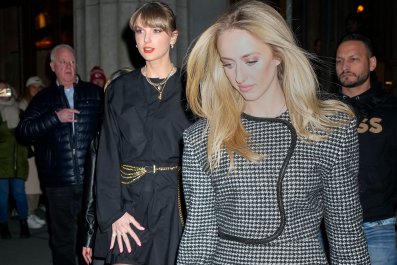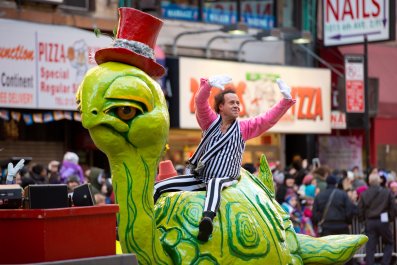In December 2021, the comedian Emma Sidi was desperately casting around for new material after almost two years of lockdown-induced hiatus when the Conservatives announced an investigation into Partygate.
“Suddenly, there was all this talk about a person called Sue Gray,” she says. “I thought, ‘great – I can eke 10 minutes out of this woman no one has ever heard of and it will do for now, even though by next week no one will be talking about her at all.’ But time went by, and she was still in the headlines. And now Labour have won the election with Gray at the helm as chief of staff. So a random thought in a moment of panic has snowballed into a show about someone who is now a vital person in the news.”
The 33-year-old, who returns to Edinburgh for the first time in six years next month with Emma Sidi is Sue Gray, is one of our sparkiest comedians. She is known for a string of comic turns including the hit telenovela spoof La Princesa de Woking, appearances in Stath Lets Flats, Ghosts, Prince Andrew: The Musical and for the uptight housemate Kate in the much-loved BBC 3 romcom Starstruck, written by and featuring her former real-life flatmate Rose Matafeo. (She will soon also pop up on Taskmaster, where she fails spectacularly at a challenge involving balls and tin cans: “But somehow they made me look almost heroic.”)
Will there be a fourth series of Starstruck, the will-they won’t-they comedy that magnificently spliced Richard Curtis-style soppiness with Fleabag’s acidity? “I’m not sure. The thing is, I’m married to Al [Roberts, her on-screen husband], the writer Alice is one of my best friends, Rose lives just round the corner. We’ve become lazy because we sort of live it all the time.”
Her 60-minute live show about Gray, which encompasses Partygate and the recent election via gags about military service and Keir Starmer’s sex appeal, is her first step into political satire. But how do you satirise a woman whose Whitehall career has placed her at the nerve-centre of Government yet whom most people would still struggle to pick out from a queue in Sainsbury’s?
“It’s true that the only thing people know about Sue Gray is that she once ran a bar in a Northern Ireland border town, and most people don’t even know that,” agrees Sidi. “But I’m a character comedian. I’ve created my Sue from scratch. She’s partly based on the basic b---- side of my personality – a person who likes nothing more than an evening spent in front of Happy Valley. But I’m also looking at the question of how much will change under Labour. It’s about finding these boring but vital parts of how our country works and looking at them with a really prosaic lens.”
In other words, it’s a 21st-century Yes Minister, filtered through Sidi’s instinct for surreal comic bathos. “Actually I’m a bigger fan of The Thick of It. I love the way the stakes are so high and yet Malcolm Tucker is so pathetic, running up and down the corridor. Politics is often so intrinsically absurd, a lot of the time it’s about letting it do the writing for you.”
Sidi is part of a new wave of comedians resurrecting character-based, sketch-driven comedy in a live scene that had lately been dominated by confessional stand-up. “We are so careful about identity now, it’s been much safer to do stand-up as yourself,” she says. “But I’d really encourage younger people coming up to take risks and not be scared of appropriating another character. It has to be OK to do that.”
Has she ever feared being cancelled? “I’m not on Twitter [now X], so I am able to not worry about it. That whole cancel-culture thing was a bit Wild-Westy for a while, but I think we are moving past it now.”
All the same, she thinks political comedy, in the dying years of the last Tory government, became stale. “Those last few years were quite bleak and depressing for everyone,” she says. “That has quite an impact on comedy – there’s been a tiredness there. Comedy had lost sight of what it was skewering. And no one was going to top that joke about the [Liz Truss] lettuce. But I think, under Labour, political comedy is going to become a lot more fun. I’ve got a pretty naughty line in Sue Gray about Ghislaine Maxwell, for instance. And I love seeing the laugh almost topple out of the audience.”
She’d prefer not to say how she voted. “But I’m very happy with the result,” she says. Her political awakening was slow. “I grew up in Woking, a very safe Tory seat [although it turned Lib Dem on July 4], with a dad who just loved Margaret Thatcher. So when I got to Cambridge [in 2009, where she studied French and Spanish] I instinctively went to vote Tory in the 2010 election, much to the horror of all my friends. Suddenly I found myself questioning everything I’d grown up with.”
At Cambridge, she successfully auditioned for Footlights. “Although it wasn’t great for women to begin with. When I didn’t get into the annual International Tour Show, which that year ended up with an all-male line-up, I was told by male students, only one year older than me, that I hadn’t ‘found my comic voice’.” She laughs. “One of them rang me a few years ago to apologise, which I appreciated.”
By the time she graduated in 2013, she was one of three women out of four on the tour. Yet her first experiences of live gigs were intimidating. “I was horrifically heckled during my first Edinburgh gig. Someone came right up to me and screamed in my face, ‘this is f------ s---’.”
I bring up Millipede, her dimwit influencer from the BBC Three vlogging satire Pls Like (her 2018 Edinburgh sketch show Faces of Grace, in which she played five existential women, also included a Love Island contestant.) Does she think vlogging culture and reality TV has exerted a dangerous influence on a generation of young girls?
“Yes, but I was watching a documentary about the Dallas Cowboys cheerleaders the other day, and in the 1970s that’s what so many girls wanted to do. And I grew up thinking Barbies are just perfect. So there has always been a bit of that. My generation grew up on Facebook, and the point of that was that you put up photos of yourself looking disgusting following a night out, because it would prove what an amazing time you had had. Today’s young women on TikTok are never going to picture themselves with mascara running down their faces. So I do think there’s a case for saying, ‘Stop taking yourself so seriously. You don’t need to look a certain way’.”
An arguably even bigger issue is social media’s impact on comedy itself. “Comedy requires a shared language – it’s a shared shorthand about what’s going on in the world,” she says. “Thanks to video-sharing sites, the conversation has become much more disparate and dissipated. So that’s a potentially very significant problem.”
As is the fact that original comedy on the mainstream channels is in seemingly terminal decline: earlier this year Ofcom declared the genre “at risk” for the sixth year in a row. “It’s a real worry, and I don’t know what the answer is. I’m about to pitch a new TV comedy because there is no point in not doing it, but I accept I’m at the mercy of what’s happening right now.” She grins. “As we say about Labour, you just have to hope things can only get better.”
Emma Sidi is Sue Gray is at the Pleasance Courtyard from July 31 until Aug 25; pleasance.co.uk
Disclaimer: The copyright of this article belongs to the original author. Reposting this article is solely for the purpose of information dissemination and does not constitute any investment advice. If there is any infringement, please contact us immediately. We will make corrections or deletions as necessary. Thank you.




